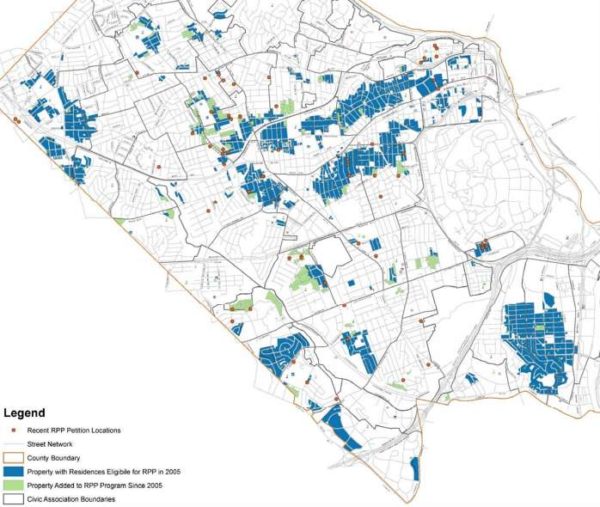Requests to add new residential permit parking zones or change current zones will be on hold for around two years so county staff can study the program’s effectiveness.
The moratorium, approved 3-2 by a divided Arlington County Board, freezes 16 active petition requests and prevents residents from filing more until after staff’s review.
Board member John Vihstadt and vice chair Katie Cristol opposed the moratorium, while chair Jay Fisette and members Christian Dorsey and Libby Garvey supported it.
Of those 16 active petitions, 15 are out in the community collecting signatures while one has been fully filled out and returned to staff at the county’s Department of Environmental Services.
Board member John Vihstadt suggested processing that petition and determining the fate of the proposed parking zone in the interests of fairness. He argued that those residents might feel as though the county has “[pulled] the rug out from under them.”
“It doesn’t seem to me to be very equitable if the petitioners have fulfilled what has been portrayed to them as all the requirements of their application and then you’re going to say, ‘Well, sorry, we’re going to put this on hold for two years,'” Vihstadt said.
“There is an element of unfairness, because you’re drawing a line somewhere,” County Manager Mark Schwartz said in response. “There will be someone or some group of people who will feel aggrieved.”
Schwartz said a moratorium is necessary so that staff can devote their time to reviewing the program. Stephen Crim, a parking planner at DES, said staff can spend anywhere between 18 and 46 hours analyzing citizen requests and making a decision.
Cristol said her opposition was rooted in the fact that petitioning neighbors can be hard work, and is the kind of action that Board members routinely praise as community engagement. But Garvey said a moratorium is necessary so staff can look fully at the program and make changes to get it right.
“I know people are going to be upset, and I’m probably going to hear from some of them and I’m sorry, but we need to not cause any more harm,” Garvey said. “I think we’ve been causing a lot of harm.”
Staff last reviewed the residential parking program in 2003, a process that also took two years. And while Board members said it works well in general across the county’s 24 residential parking zones, they discussed some issues with the program and how it can be fixed.
Dorsey said the county’s current “one size fits all” approach to residential parking is not as effective given the differences between neighborhoods near Metro stations and ones with single-family homes. Garvey said it can appear that more parking passes are distributed than there are spaces for cars, while Cristol and others asked about the legality of allowing any Arlington resident to park in any residential zone if they have a county registration sticker.
While residential parking zones are popular with homeowners in Metro corridors and near employment centers, because it prohibits commuters and other non-neighborhood residents from parking in front of their homes during certain hours, it has also faced criticism for making parking more difficult around business districts and advantaging certain Arlington residents over others on taxpayer-funded streets.
Vihstadt, meanwhile, spoke of the apprehension in the community when new apartment and condo buildings are built, as nearby residents worry that those projects will not have enough parking and so be forced to use street parking instead.
Fisette said the program has certainly been effective in its original intent. When it began in 1973 in the Aurora Highlands neighborhood, the residential parking permit program was to prevent commuters from outside Arlington parking by people’s houses on their way into Crystal City or D.C. The U.S. Supreme Court upheld the program in 1977 in the decision “Arlington County Board vs. Richards.”
Staff proposed a process to gather data, engage the public using “deliberative dialogues” rather than trying to build consensus around an issue that they said will always leave someone upset, before coming to the Board for a work session, refinements and final approval. Crim said that final approval could be around May or June 2019.
Arlington’s residential parking zones image via county presentation


